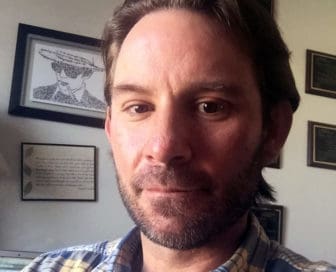
Heath Haussamen / NMPolitics.net
The message from The Rio Grande Chapter of the Society of Professional Journalists’ Board to officials who obstruct the process of truly transparent government is: The party is over.
COMMENTARY: “Secrecy is the freedom zealots dream of: no watchman to check the door, no accountant to check the books, no judge to check the law. The secret government has no constitution. The rules it follows are the rules it makes up.” — Bill Moyers, journalist
The word “transparency” once carried substantial weight in the public debate about how government best functions. Those committed to transparency — and those committed to fighting for it — were those committed to a healthy, functioning democracy.

Courtesy photo
Jeff Proctor
Perhaps the good old days weren’t so good, but it’s difficult to argue that things have gotten better on the open government front.
“Transparency” has slipped into the cacophony of endlessly uttered political buzzwords, with each new elected official proclaiming his or hers “the most transparent administration in (fill in the blank) history.”
It is happening at all levels of government: from the mayor of New Mexico’s largest city to state legislators to this state’s governor to the president of the United States.
“Transparent” is the new “The buck stops here.”
On the ground, things are murkier. The word doesn’t mean much anymore. The problem is bipartisan. From those who have stated time and again their commitment to transparency, we have seen a litany of transgressions from both ends of the political spectrum.
Albuquerque Mayor Richard Berry settled a lawsuit for withholding public information from journalists and filmed himself signing three controversial vetoes for a YouTube video. (No journalists were allowed in the room to ask questions on behalf of the public.) We have seen Berry’s appointed police chief, Gorden Eden, pull a similar stunt to announce that one of his officers may have violated a homeless man’s civil rights. Again, no journalists were present to question the chief.
It took a dogged journalist — a journalist with legal counsel — to pry loose from Gov. Susana Martinez’s administration the names of licensed medical marijuana producers. Further, Martinez is about to stand trial in civil court for allegedly violating a newspaper’s First Amendment rights, not to mention New Mexico’s best known transparency law.
And a bill passed by the Legislature just last month, then signed by Martinez, that purported to bring more transparency to the state’s campaign finance system made the system … less transparent. Truly.
March 13 marked the beginning of Sunshine Week, a time to celebrate successes in open government and to redouble our efforts toward opening the doors that remain closed. Sunshine Week arrives not a moment too soon; for there is not nearly enough sunshine in our state — despite officials’ optimistic tourism ads featuring idyllic scenery and perfect weather.
We at the Rio Grande chapter of the Society of Professional Journalists take the occasion of Sunshine Week to announce our own redoubling. In the coming year, we plan to take a more active role in the struggle for transparency. Collectively, we will push to strengthen the Inspection of Public Records Act and the Open Meetings Act. We will examine how well government agencies are complying with those laws — and make those findings public. We will speak out when public officials fall short of their rhetoric on transparency. And we will support journalists around the state in their efforts to hold the powerful accountable.
Individually, we will continue to shine a light in the dark corners of government by publishing stories in the public interest.
Our chapter recently held elections for board directors. Some of us are old hands. Others are new to the board. We have directors from print, digital, radio and television as well as two journalism professors. Many of us compete against one another for stories. But when it comes to advocating for transparency, we stand very much together. Our strength is our diversity, and our message to officials who obstruct the process of truly transparent government is: The party is over.
It is easy to see the fight for transparency as journalistic navelgazing: A bunch of reporters complaining that government officials are shutting them out. Nothing could be further from the truth. Journalists work for readers, viewers and listeners — to inform citizens. When citizens are informed, and when government is open, democracy functions better. We ask all New Mexico citizens to join us in furthering the mission of transparency during Sunshine Week and beyond.
Jeff Proctor, a New Mexico journalist, is a member of The Rio Grande Chapter of the Society of Professional Journalists’ Board. He wrote this column on behalf of and with input from the board.
